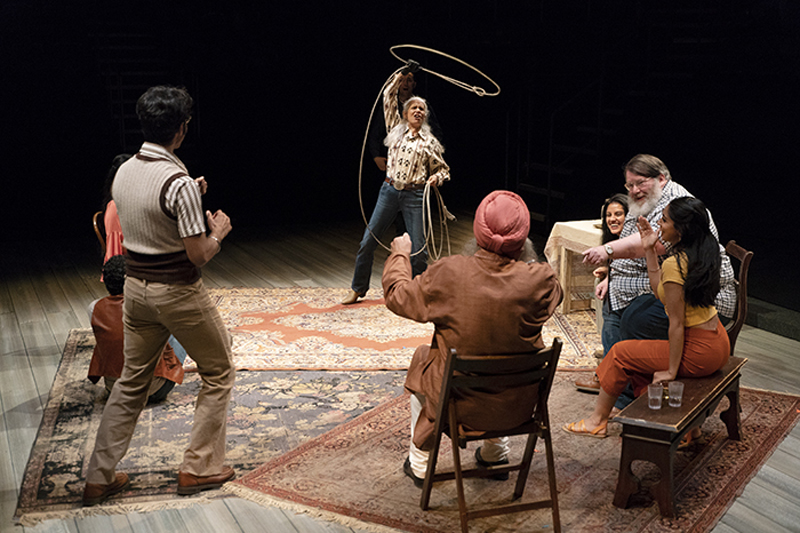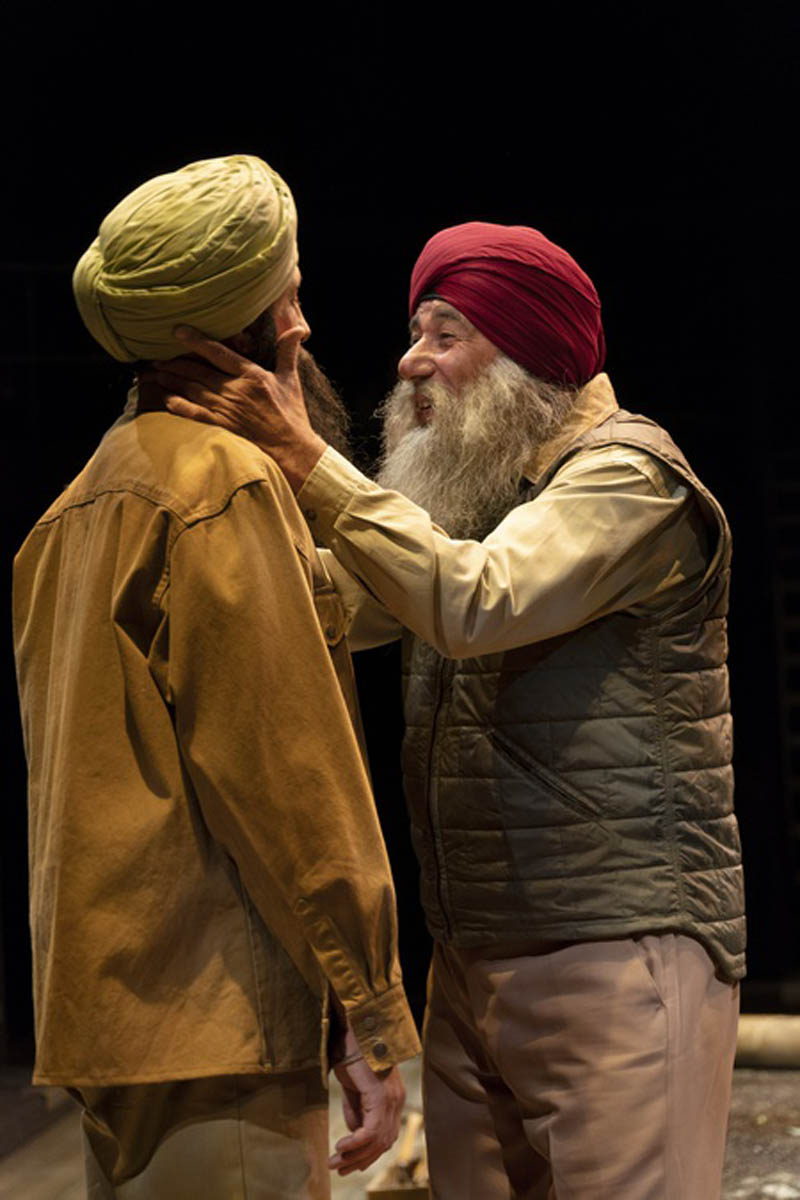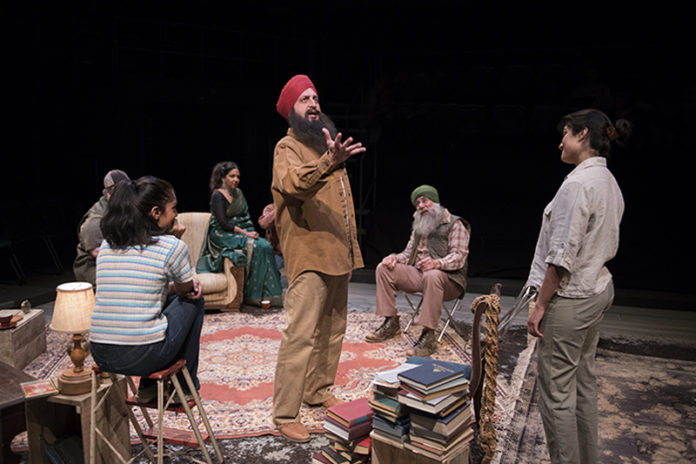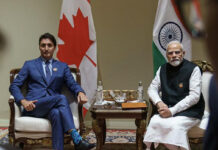Revealing the Greening of Canada


Those of us who have chosen to make Canada our home – over the last 1 year or 5, or 20 or 40, or more – have many stories to tell. Some of those stories are soaked in tears, some in irony, some in pathos.
And some in great loss, and some in excruciating longing for the motherland we left behind.
And some, of course, in great triumph!
At the Shaw Festival in Niagara-on-the-Lake, Punjabi playwright Sarena Parmar’s play The Orchard (After Chekhov), under the direction of Ravi Jain, presents all this wide spectrum of emotions with heart-rending poignancy and quiet aplomb.
The Orchard tells the story of a Punjabi Sikh family trying to lay its roots in an orchard in the Okanagan Valley in British Columbia in the 1970s amongst people who had lived, for decades, in a cloistered world of their own, with easy, cliché-ridden images of others, of different ethnicities and faiths.
The Punjabi family comprises of children and young men and women, and there are venerated elders given to hard bone-crushing labour, all steeped in their own unquestioning and un-questioned centuries-old traditions and culture, so richly marked by rituals, symbols and ceremonies at every hour of day and night.
Each one of them, it seems, carries a world of its own inside their head
The Okanagan Valley in British Columbia in Canada and ‘the land of five rivers’, Punjab in India, are on the opposite sides of the globe; they may not seem all that far today in the age of mobile phones and internet, but in the 1970s, for a family from rural Punjab, it was truly a world apart, as though on another planet.

The Orchard, with its inspiration and an occasional reference to the celebrated Russian play, The Cherry Orchard by Chekhov, un-weaves the trials and tribulations of this Sikh family in Canada at a time when the idea of multiculturalism was just becoming, under the bold and creative leadership of Prime Minister Pierre Trudeau, the new creed in Canada, with all its social and political uncertainties and trepidations.
With a certain generous heart, one could say, that The Orchard is a glimpse into the greening of Canada in the past half century.
Could this Sikh family ever imagine then, that, a quarter century later, the Premier of British Columbia would be a Punjabi Sikh, and some forty years later, they would see a turbaned Sikh become the Minister of Defence of Canada under another Trudeau?
As Canada becomes home to many more people from many more lands, one may ask: “Where are we going?”
But also, “Where did we come from, and how far have we come?”
In the 1840s, in the aftermath of the devastating potato famine in Ireland, as the famished and the diseased Irish men, women and children landed in Canada, they were shunned and were treated with utmost disdain.
In the 1880s, more than 17,000 Chinese labourers worked on railroads under the harshest of conditions, linking Canada from one end to the other, and laying the foundations for the dream of Canada as a nation, and then only to be struck with an odious ‘head tax’ for decades.


Sanjay Talwar as Gurjit with David Adams as Kesur in The Orchard (After Chekhov). Photo by David Cooper.
At the same time, in the mighty land south of Canada, in 1888, the great Statue of Liberty was being erected in the New York Harbor, with the ringing words of a young socialist Jewish poet, Emma Lazarus, welcoming millions to its shores from far and wide:
Give me your tired, your poor,
Your huddled masses yearning to breathe free,
The wretched refuse of your teeming shore.
Send these, the homeless, tempest to me,
I lift my lamp beside the golden door!
“Look at that mass of foreign ignorance and vice which has flooded that country with socialism, atheism and all other isms,” moaned the first Prime Minister of the Dominion of Canada, Sir John A. Macdonald, as he boasted with great pride of Canada’s restricted immigration policy at the time.
At the same time thousands of indigenous children of First Nations were being taken away from their homes and their cultures and shoved away in residential schools so as “to take the Indian out of the child”, perpetrating a ‘cultural genocide’ over many decades.
In these past sixty years, Canada has been generous and welcoming to immigrants and refugees from Hungry and Czechoslovakia, India and Jamaica, Uganda and Sri Lanka, Vietnam and Somalia, Haiti and Syria, and thousands of war-resistors from the USA; at each step, and every year, Canada’s face has assumed many new and here-to-unknown colours, and its hues have become ever more vibrant, and its roots have deepened.
Canada has become a ‘Rainbow Nation’, in the celebrated words of Archbishop Desmond Tutu.
As people from so many varied and ancient lands make Canada their home, with renewed self-confidence, and with well-honed skills in theatre, films, music, dance, arts and poetry, they are all re-defining and re-formulating Canadian culture, and are enriching it in a thousand different ways.
The Orchard, under the deft and imaginative direction of Ravi Jain at Jackie Maxwell Studio Theatre at the Shaw Festival, is a most welcome step in that direction.
The Shaw Festival is a major theatre festival in Canada, with well-deserved international reputation, drawing audiences from all over the world, to this most picturesque wine-country in Ontario.
I hope there will be playwrights with Chinese, Ukrainian, Korean and Irish stories and experiences to enliven the stages at Shaw and other festivals in Canada.
Next year, in 2019, the Shaw Festival is presenting the great Indian epic The Mahabharata under the direction of Ravi Jain.
So now, in The Orchard, for me to see a man, David Adams, with a flowing beard and a turban on a stage at Shaw, speaking half in English and half in Punjabi, to a host of talented multicultural performers – Shawn Ahmed, Jeff Meadows, Sanjay Talwar, Jani Lauzon, Andrew Lawrie, Krystal Kiran, Pamela Sinha and others – presented a new and vibrant face of New Canada, at once the hope of the world, and of our new century.
Bravo!
(Prof Sehdev Kumar lectures on “International Cinema and the Human Condition” at the University of Toronto. He is author of The Vision of Kabir, about the great 15th century Indian mystic-poet. His forthcoming book is, “7000 Million Degrees of Freedom”)
ALSO BY PROF SEHDEV KUMAR: Toronto celebrating great music at Soulpepper this summer








